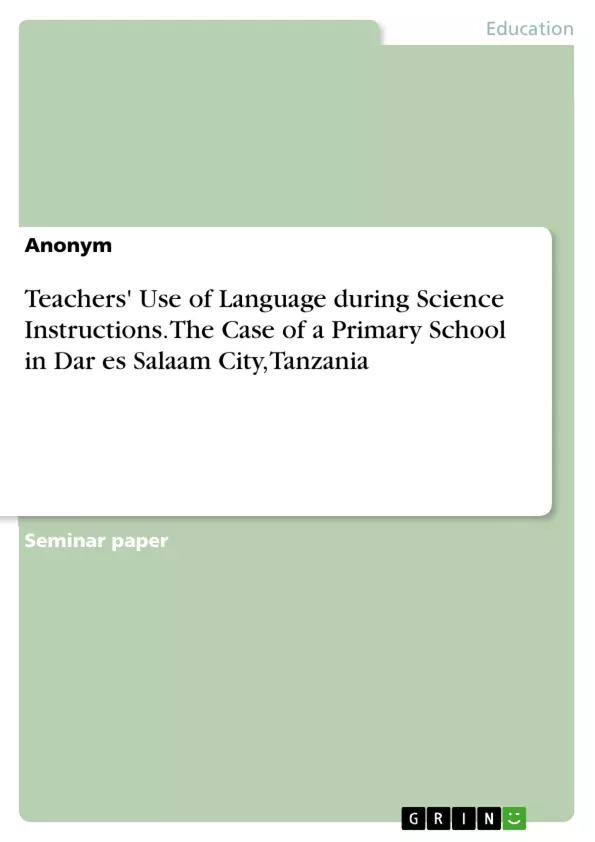A number of scholars have advised on the importance of the correct use of language and what teachers should do in order to reduce the problem of difficulty in science and technology courses. Bl Young, (1979), states that teachers need to use either a local language or the language which is more generally spoken or English to explain the meaning of scientific terms to learners. Looking at the same topic, Taylor (2006), accepts Young’s contribution and says that communication in science is a means to offer support to students to build understanding in science concepts and the role of the teacher is to help in the process of developing an understanding of scientific concepts.
Most countries around the world are interested in science and technology, which is the reason why many developed countries around the world owe their Growth Domestic Product, which is the measure of a country’s wealth, to science and technology. In Uganda, almost all universities that are government sponsored, are those offering science and technology related courses. Gudula (2017), observes that the above-mentioned areas of study are not only challenging to many learners in a given country, but also to many learners around the world and there is a need to have this problem solved so that the numbers of students taking science and technology related courses increases in the higher institutions of learning. One of the problem areas that engulfs many countries (including Tanzania), is the poor results of pupils in science at primary school level. Making further analysis in the matter, Gudula (2017), asserts, "It has been recognized for decades that there is worldwide underachievement in science education and international research have shown that issues on language are key areas contributing to high failure rates in the subject".
Inhaltsverzeichnis (Table of Contents)
- Introduction
- Statement of the problem
- The purpose of the study
- Research Questions
- Rationale
- Ethical Considerations
- Literature Review
- Language of Instruction
- Importance of language in science teaching
- Scope and limitations of the study
- Methodology
- Research methods
- Data collection tools
- Population and Sample
- Sampling technique
- Presentation of the findings
- Discussion of results
- Lessons learnt
- Recommendations
- Conclusion
- REFERENCES
Zielsetzung und Themenschwerpunkte (Objectives and Key Themes)
This study aims to investigate how science teachers use language during classroom instruction to facilitate students' understanding of science concepts. It seeks to understand the role of language in promoting conceptualization of ideas and explore whether teachers effectively explain technical and non-technical terms to students.
- The significance of language in science education and its impact on student learning
- The challenges of language use in science classrooms, particularly in diverse contexts
- The role of teachers in using language to promote conceptual understanding and engagement with scientific concepts
- The importance of explicit instruction in technical and non-technical vocabulary for science learning
- The need for teacher training and professional development to enhance language use practices in science classrooms
Zusammenfassung der Kapitel (Chapter Summaries)
- Introduction: This chapter presents the problem of poor science performance in primary schools, particularly in Tanzania, and discusses the importance of language in science education. It highlights the need to understand how teachers utilize language in classrooms to effectively convey scientific concepts.
- Literature Review: This section provides a theoretical framework for the study by exploring various perspectives on the language of instruction, the role of language in science teaching, and the significance of teachers' language use in facilitating understanding.
- Methodology: This chapter outlines the research methods, data collection tools, population and sample, and sampling techniques employed in the study.
Schlüsselwörter (Keywords)
This study focuses on key concepts like science education, language use, classroom instruction, teacher practices, student understanding, technical vocabulary, non-technical terms, and conceptualization of scientific ideas.
Frequently Asked Questions
Why is language choice important in science education?
Correct language use is essential for students to build conceptual understanding and reduce the difficulty of technical science and technology courses.
What is the specific case study in this research?
The study investigates teachers' use of language during science instruction in primary schools in Dar es Salaam, Tanzania.
What are technical vs. non-technical terms in science?
Technical terms are specific scientific vocabulary, while non-technical terms are general words used in a scientific context that can still cause confusion for learners.
How does language contribute to failure rates in science?
Research shows that language barriers are key factors in high failure rates, as students often struggle to grasp complex ideas when they aren't explained in a familiar language.
What are the recommendations for science teachers?
Teachers are encouraged to use local languages or English more effectively to explain scientific meanings and to receive professional development in language-sensitive teaching.
- Quote paper
- Anonym (Author), Teachers' Use of Language during Science Instructions. The Case of a Primary School in Dar es Salaam City, Tanzania, Munich, GRIN Verlag, https://www.grin.com/document/1365496



